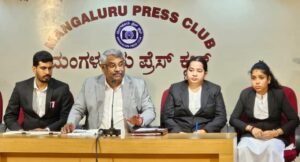Mangaluru, Aug 23: A group of coastal lawyers has demanded a crucial legal reform that could change the way justice is accessed in India: allowing writ Powers to be heard in district courts. The lawyers argue that this amendment will make justice quicker, cheaper, and more accessible to the poor and needy who often struggle to reach distant High Courts.

The demand was highlighted at a press conference in Mangaluru by former district government pleader Manoraj Rajeev, along with advocates colleagues Shishir Bhandari, Roshni Sorab, and Nandini Akil . They also pressed the long-standing call for a separate High Court bench in Mangaluru, but stressed that the writ jurisdiction powers to district courts by getting in an legislation empowering district courts to deal with limited writ jurisdiction within their jurisdiction to achieve constitutional obligations . This move would create a revolutionary mechanism in judiciary.
Manoraj Rajeev said that, Article 32(3) of the Constitution, which empowers Parliament to authorize subordinate courts to exercise writ powers—traditionally the domain of the Supreme Court (Article 32) and High Courts (Article 226). “District courts can be given limited writ jurisdiction without disturbing the authority of High Courts. This will especially benefit rural litigants who are otherwise deprived of justice due to distance, cost, and delays,” he said.
“Constitution 32(3) is a clause in the Indian Constitution’s Article 32, which grants Parliament the power to authorize other courts, besides the Supreme Court, to exercise writ powers (such as Habeas Corpus, Mandamus, Prohibition, Certiorari, and Quo Warranto) to enforce Fundamental Rights within their local jurisdiction”
At present, all writ powers—even against orders by local tribunals, revenue courts, or police authorities—must go to High Courts. This, places heavy financial burdens and time consuming for ordinary citizens.
To maintain judicial hierarchy, appeals from district court writs would still lie before the respective High Courts. Manoraj Rajeev clarified that this reform would not dilute the status of High Courts but rather complement their functioning.
Memoranda have been submitted to the Prime Minister, Union Law Minister, and leaders of the Opposition, urging Parliament to pass a law under Article 32(3) at the earliest. “This is not just about the coastal region. This is about ensuring no citizen in the country is denied justice because of geography or poverty,” Manoraj Rajeev asserted.
The proposed reform would:
- Allow district courts to handle writs related to local bodies, panchayats, municipalities, and statutory authorities.
- Ensure time-bound disposal of fundamental rights and public interest cases. Reduce case backlogs in High Courts.
- Deliver speedy justice at the grassroots without additional financial burden, since existing district court infrastructure can be used.







